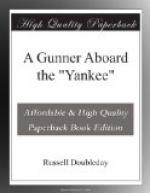To have one more good fight—in which we were to come out victorious, of course—get a few souvenir shot holes where no harm would be done, and then go home. This would just about have suited us.
We floated around lazily all day Friday and Saturday with a chip on our shoulder, as it were, but no “Monserrat” came to knock it off.
The lookouts at the masthead strained their eyes, and half the men not actually at work did likewise. All in vain; not an enemy did we see. A number of transports homeward bound, bearing worn but happy soldiers, were passed, and some came near enough to exchange cheers and good wishes.
The screw revolved but slowly, and the ship moved just enough to give steerage way. Every passing wave did as it wished with the great hulk, and she rolled like a log in the long swell.
Sunday night a change came over the almost quiet ship. The propeller turned with some energy; the steering engine whirred, and the “Yankee” changed her course. This time she headed straight for Guantanamo, and before many minutes we knew that we were returning to our old anchorage. The orders were to blockade the passage and keep a bright lookout for the “Monserrat”; if by Sunday at six o’clock she had not appeared, we were to return to the fleet.
The men who were so sure that we should never see Guantanamo again wore a sheepish air, and those who were not so sure lorded over them and remarked cheerfully, “I told you so.”
Those of us who were sleeping at midnight were wakened and told to come to the port and look. Sleepily we obeyed, but the moment we reached the opening we were wide awake. There, not three miles off, rolling in the ground swell, lay a great fleet, the searchlights sweeping the heavens and sea; the signal lanterns twinkling.
As we looked, we saw at the masthead of the foremost vessel the signal lights spell out A followed by D, the “Yankee’s” private night signal. Then, and our eyes almost started from our heads as we gazed, the lights continued to spell:
“Blockade raised; hostilities ceased.”
“Hurrah!” shouted some one behind me.
“Wait a minute,” said “Hay,” “that’s not all.”
The lights went on spelling: “We are on our way to New York. You are to proceed to Guantanamo.”
The hurrah, as we spelled out the first sentences, was followed by a groan, as we read the last. We were glad, indeed, to know that peace had come, but it was hard to see that great fleet homeward bound, and know that we must go back to our old post, to stay indefinitely.
“Hope deferred maketh the heart sick.”
CHAPTER XX.
TAPS.




